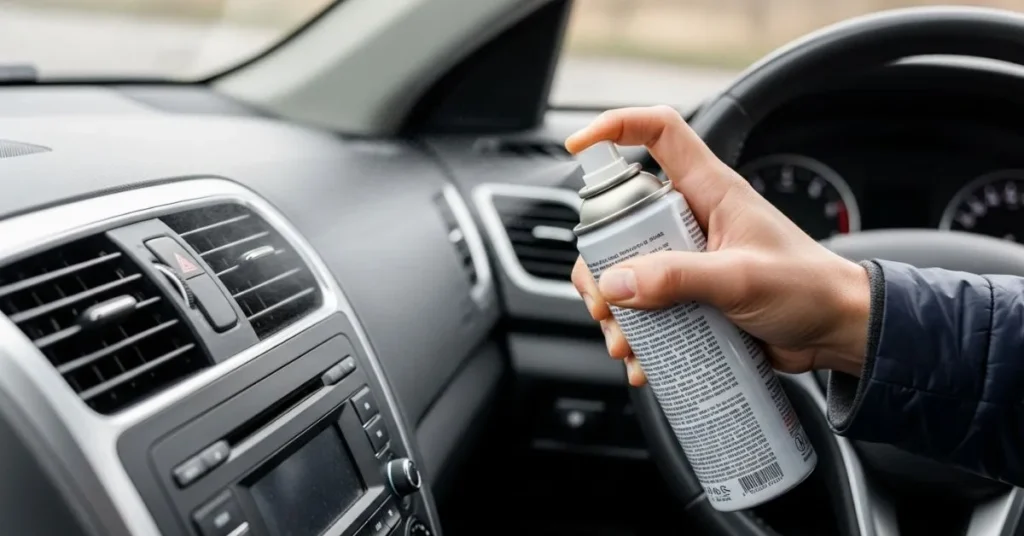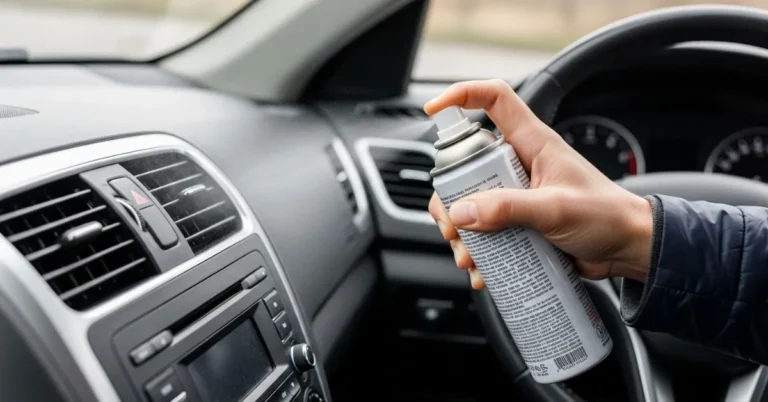
“Can I spray air freshener in my car vents without damage?” If you’ve ever climbed into your car after a long day and thought, “Wow, this cabin smells like old fries and wet dog had a party in here,” you’re not alone. Many U.S. drivers reach for the easiest solution: a can of air freshener. One quick spritz into the vents and voilà the smell of lavender fields, ocean breeze, or “new car” bliss fills the space.
But here’s the catch: while your nose celebrates, your car’s delicate ventilation system might cry. Spraying directly into vents can sometimes lead to clogged filters, sticky residue, or worse health concerns you didn’t sign up for.
Before you treat your dashboard like a perfume counter, let’s investigate whether vent spraying is safe, what risks it carries, and what smarter (and healthier) alternatives exist. Buckle up we’ll dive deep into keeping your ride fresh without regret.
Contents
- 1 Can I spray air freshener on my car vents?
- 1.1 Why Drivers Spray Air Freshener in Car Vents
- 1.2 What Happens Inside Your Car Vents
- 1.3 Health Concerns: Breathing in More Than Freshness
- 1.4 Safer Alternatives to Spraying Air Freshener in Car Vents
- 1.5 Car Freshener Trends: Going Green
- 1.6 Budget-Friendly Tips for a Naturally Fresh-Smelling Car
- 1.7 Step-by-Step: Safely Cleaning Your Car Vents
- 1.8 When Spraying May Be Okay (With Precaution)
- 1.9 FAQs
- 1.9.1 1. Can I spray air freshener in my car vents if the smell is unbearable?
- 1.9.2 2. What’s the safest way to freshen car vents?
- 1.9.3 3. Can air fresheners make drivers sick?
- 1.9.4 4. Do eco-friendly car air fresheners and sprays work?
- 1.9.5 5. How often should I clean or replace my cabin air filter?
- 1.10 Expert Thoughts: Should You Spray Air Freshener in Car Vents?
- 1.11 About the Author
Can I spray air freshener on my car vents?
The big question. Can I spray air freshener in my car vents without damage? Technically, yes you can. But should you? Not really.
Car vents aren’t designed to be fragrance dispensers. They’re meant to move air through a carefully designed pathway, including ducts, filters, and sometimes sensitive electronic sensors. When you spray into them, those mist particles cling to surfaces, pile up on filters, and may even affect airflow.
Over time, that “fresh blast” of scent could lead to:
- Faster clogging of cabin air filters.
- Sticky residue attracts more dust and dirt.
- Lingering dampness can invite unwanted mold or mildew to take hold.
In short, you’re solving one problem but possibly creating two more.
Why Drivers Spray Air Freshener in Car Vents
Let’s be fair vent spraying feels like genius. Bad smell? Spray directly into the source that pushes air everywhere. Instant solution, right?
It’s the same logic as spraying Febreze into your home’s HVAC system. (Spoiler alert: heating and cooling techs everywhere are screaming “please don’t!”).
Drivers use vent sprays because:
- Convenience – It takes 5 seconds.
- Coverage – The scent reaches the entire cabin.
- Perception – We believe fresher-smelling air equals “clean.”
But smells don’t disappear with sprays; they just get covered up. That leftover fast-food funk? It’s still there. The damp carpet odor? It’s still lurking. The vent spray temporarily hits the pause button.
What Happens Inside Your Car Vents
Imagine your vents as lungs. When you breathe in, oxygen flows through delicate passageways. Now imagine spritzing perfume into those lungs daily. It doesn’t sound too healthy.
Inside your car vents, sprays can:
- Coat surfaces: The ducts are lined with plastics that collect residue.
- Clog filters: Cabin air filters catch more particles than you think. Add spray chemicals, and you’ll shorten their lifespan.
- Mix with moisture: Cars naturally build condensation. Spray mist, dust, and moisture are breeding grounds for mildew.
The result? You may end up with a smell worse than before the dreaded “musty AC” odor.
Read More: Can Car Air Fresheners Damage Your Car – The Truth
Health Concerns: Breathing in More Than Freshness
Here’s another angle: your health. Many air freshener sprays contain VOCs (volatile organic compounds), chemicals that evaporate quickly and give products their “fragrance.” Sounds harmless. Not exactly.
Too much VOC exposure can lead to:
- Headaches
- Dizziness
- Allergic reactions
- Asthma flare-ups
Have you ever felt sleepy or slightly off after a long drive with a heavy fragrance? That’s not just road fatigue it could be what you’re inhaling. Families with kids, pets, or anyone with sensitivities should especially take note.
Safer Alternatives to Spraying Air Freshener in Car Vents
Now for the good news: plenty of safer, smarter options exist.
1. Vent Clips
Instead of spraying into vents, let vent clips do the work. They release fragrance gradually, without pushing chemicals deep inside your ventilation system. Bonus: they come in every scent imaginable.
2. Cabin Air Filter Replacement
Sometimes the smell isn’t from the air it’s from your filter. Replacing it once a year (or every 12,000–15,000 miles) can do wonders. Imagine swapping out an old vacuum bag it instantly feels fresher.
3. Activated Charcoal Bags
Charcoal is affordable, reusable, and eco-friendly. It naturally absorbs odors without masking them. Toss one under a seat, and it quietly does its job 24/7.
4. Essential Oil Diffusers
These small gadgets clip onto vents but don’t harm the system. Mix in a few drops of lavender or citrus essential oil for a fresh, chemical-free scent.
5. DIY Natural Sprays
Create a simple car freshener by blending a few drops of essential oil into a water bottle. For an affordable and safe option, lightly mist seats or carpets avoiding the vents.
Car Freshener Trends: Going Green
More U.S. drivers are ditching chemical sprays in favor of eco-conscious products. Sustainability isn’t just for groceries or clothes it extends to car care, too.
Trends include:
- Plant-based sprays are free of harsh chemicals.
- Reusable diffusers that last longer and cut down on plastic waste.
- Biodegradable odor absorbers (like bamboo charcoal bags).
Eco-friendly fresheners aren’t just better for the planet they’re safer for your car and lungs.
Budget-Friendly Tips for a Naturally Fresh-Smelling Car
Not everyone is eager to splurge on high-end air fresheners. The good news is that staying fresh can be budget-friendly and even enjoyable.
- Baking soda under the seats absorbs odors naturally.
- Coffee grounds in a breathable pouch smell amazing (and wake you up).
- Dryer sheets tucked under mats or in seat pockets add subtle fragrance.
- Vinegar bowls left overnight (with windows cracked) neutralize stubborn odors.
Sometimes grandma’s cleaning hacks beat modern sprays by a mile.
Step-by-Step: Safely Cleaning Your Car Vents
If odors are vent-specific, here’s the right way to tackle them:
- Turn off your car and open all doors/windows.
- Locate the cabin air intake (usually near the windshield wipers).
- Use an automotive vent foam cleaner. Spray into the intake while running the fan on high.
- Replace the cabin filter to trap leftover residue.
- Finish with a vent clip or diffuser for ongoing freshness.
This method cleans the source instead of masking it.
When Spraying May Be Okay (With Precaution)
There are scenarios where a quick spritz might be fine say, you’re heading to a carpool pickup and want to mask that fast-food smell for five minutes.
If you must spray:
- Avoid direct vent spraying. Instead, spray lightly near the cabin intake outside the car.
- Choose alcohol-free, fabric-safe sprays.
- Don’t overdo it. One or two short bursts are enough.
Think of it as a last resort not a regular habit.
Read More: Do Car Air Fresheners Work in Rooms? Experts Weigh In
FAQs
1. Can I spray air freshener in my car vents if the smell is unbearable?
Yes, but sparingly. It’s better to clean vents or replace the cabin filter for lasting results.
2. What’s the safest way to freshen car vents?
Use vent-specific foam cleaners, replace filters regularly, and add vent clips or charcoal bags.
3. Can air fresheners make drivers sick?
They can. VOCs from sprays may cause headaches, allergies, or dizziness, especially in enclosed spaces.
4. Do eco-friendly car air fresheners and sprays work?
Yes. Charcoal bags, reusable diffusers, and essential oils are highly effective without the downsides of chemicals.
5. How often should I clean or replace my cabin air filter?
Most automakers recommend every 12,000–15,000 miles or once a year, more often if you drive in dusty or humid conditions.
Expert Thoughts: Should You Spray Air Freshener in Car Vents?
So, let’s reevaluate: Can I spray air freshener in my car vents without damage? Yes, but it’s not recommended. While you’ll enjoy a fresher smell in the short term, you risk clogged filters, residue buildup, and possible health side effects in the long term.
Instead, stick with safer alternatives: vent clips, natural odor absorbers, cabin filter swaps, and eco-friendly products. They’re healthier, affordable, and kinder to your car’s systems.
Your car deserves better than a chemical fog and so do your lungs.




